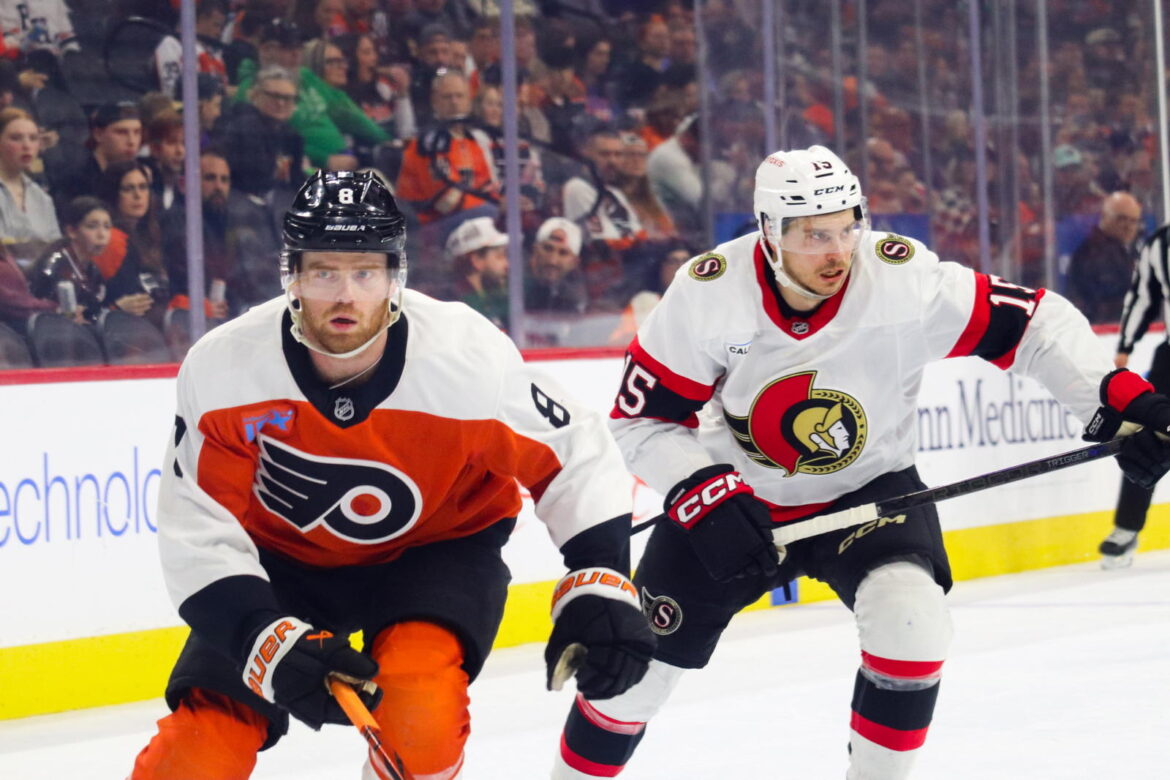After a productive two-game swing through Montreal and Nashville, the Philadelphia Flyers return to Xfinity Mobile Arena with four points and a little bit of tension released from their shoulders.
They didn’t just collect a road sweep; they rediscovered some rhythm. A shootout win in Montreal showed their persistence, and a 3–1 victory in Nashville demonstrated a more grounded, mature team effort. Now, as they prepare to face the Ottawa Senators, the Flyers will look to translate that steadiness into a consistent home-ice identity.
A Team Settling Into Its Adjustments
What’s been most notable about the Flyers over the past week isn’t any individual performance but how well they’ve adapted to change. Tyson Foerster’s lower-body injury forced head coach Rick Tocchet to shuffle his forward lines, and what began as a necessity has evolved into something that’s genuinely working.
Siobhan Nolan (@SGNolan) on X
Tocchet had an interesting response about switching up the Flyers’ lines b/c of Tyson Foerster’s injury. Left things up in the air in terms of returning back to the lines they started the year with, even leaving things open on whether the Foerster-Cates-Brink line would return.
Bobby Brink has meshed surprisingly well alongside Matvei Michkov, adding energy and pace that complements Michkov’s creativity. Christian Dvorak’s line with Trevor Zegras and Owen Tippett “has been good for us,” in the words of head coach Rick Tocchet — a mix of puck possession and defensive responsibility that’s given Tocchet dependable middle-six minutes.
It’s an encouraging sign for a coach who values structure but isn’t afraid to let his players breathe within it. The Flyers aren’t playing “safe” hockey right now — they’re playing informed hockey, where their system dictates their decisions rather than their nerves.
Ersson’s Return Eases the Workload
Between the pipes, there’s more good news. Sam Ersson, who missed a brief stretch with a lower-body injury, is once again available for selection, and will get the start against Ottawa.
Dan Vladar has held his own — and then some — in Ersson’s absence. His performance in Nashville, particularly during a second period where the Predators swarmed the crease with heavy traffic, was calm and composed. He read plays cleanly, held his positioning, and managed rebounds effectively.

Still, asking any goaltender to carry consecutive games on short rest can wear thin over time. Ersson’s availability doesn’t just offer rest; it restores flexibility. Tocchet now has the freedom to manage both goalies based on matchup and rhythm rather than necessity.
Ottawa’s Offensive Push and What the Flyers Must Counter
Ottawa arrives in Philadelphia as a team that can still score in bunches, even if consistency remains an issue.
Cam York’s recent form, in particular, has been a bright spot. Against Nashville, he looked confident and efficient, breaking up rushes early and managing the puck with poise. If the Flyers can maintain that kind of control in their exits, they can neutralize Ottawa’s quick-strike tendencies.
Discipline will also be key. The Flyers have had their share of testy games, but they can’t afford to give them extended opportunities to find rhythm. Tocchet’s group has leaned on its penalty kill as a foundation all season, but the goal will be to spend less time relying on it.
Continuity, Not Complacency
One of Tocchet’s subtler victories in recent weeks has been instilling patience in how this team approaches progress. The back-to-back wins weren’t always flashy, but they were composed — the kind of hockey that holds up over time.
The Flyers are still a team learning to manage momentum instead of chasing it. Their depth scoring is coming alive again, and their defensive structure looks tighter, but Tocchet has made it clear that the standard doesn’t change based on results.
That’s what will make the Ottawa game a useful barometer. Can the Flyers take the maturity they’ve shown on the road and bring it home? Can they avoid the lulls that sometimes creep in when the adrenaline of travel fades?
Those questions will define whether this recent stretch is a temporary upswing or the start of something more stable.
Projected Lines
Philadelphia Flyers:
Forwards:
Owen Tippett – Christian Dvorak – Trevor Zegras
Matvei Michkov – Sean Couturier – Bobby Brink
Nikita Grebenkin – Noah Cates – Travis Konecny
Carl Grundstrom – Rodrigo Abols – Garnet Hathaway
Defense:
Cam York – Travis Sanheim
Nick Seeler – Jamie Drysdale
Emil Andrae – Noah Juulsen
Goalies:
Sam Ersson
Dan Vladar
Ottawa Senators
Forwards:
Nick Cousins – Tim Stutzle – Drake Batherson
Ridly Greig – Dylan Cozens – David Perron
Michael Amadio – Shane Pinto – Claude Giroux
Kurtis MacDermid – Lars Eller – Fabian Zetterlund
Defense:
Jake Sanderson – Artem Zub
Thomas Chabot – Nick Jensen
Tyler Kleven – Nikolas Matinpalo
Goalies:
Linus Ullmark
Leevi Merilainen
